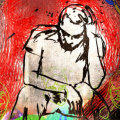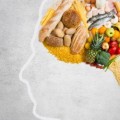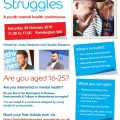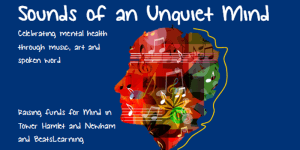
Sounds of an Unquiet Mind
The following piece is dedicated to the memories of Nabil & Saeed
How do I even begin talking about mental health? What do I say to reveal enough about myself so you feel that I’m qualified to speak on this, but not so much as to expose my open wounds to criticism and ridicule? Maybe my open wounds are the only way you can see that mental health is not something to be taken lightly. Perhaps the scars from my past and the wounds in my present are the language of love and belonging in a world that’s becoming somewhat divided but increasingly self-aware.
The topic of mental health encompasses two primary interwoven areas; psychological well-being and emotional intelligence.
Let me start here by telling you that I didn’t get this information solely from a bunch of reading I did; the information I’m presenting right now also comes from years of practical experience, analysis and late-night discussions with academics from the field. I’m presenting mental health to you on the basis of what I’ve come to understand, but if you’re looking for specific references or a degree-holder then go read a book.
Let me also tell you that this is pretty long. So, either strap in and open your mind or skip to the end if you’re looking for the conclusion.
Psychological well-being is the quality of my thoughts and state-of-mind. It’s my ability to exercise critical thinking and to use my mind in a positive way which is of benefit to my learning and growth. Psychological ill-health is when my mind circulates around self-criticism and negative thought-loops which influence my actions heavily. It is the “bad day”, or week, or six months. It is my inability to shake the feeling that I don’t belong here and I never will. Or that any pain I experience is likely to be permanent; and why would anyone choose this life over choosing the ultimate freedom? This has been my experience so far.
Emotional intelligence is what I see as the two-headed creature. If you’re not familiar with this creature then it’s usually because you’re blind to the fact that it’s leading you and you’re following close behind. If you don’t have the ability to empathise with other people; it’s usually because you lack emotional intelligence. This is where I once was; and I was fine with it. Until I wasn’t. The reason I call it the two headed creature is because on one head, it’s my friend, my angel and my guide. And on the other head, it’ll dunk me into the sea of grief and sorrow and hold me down, at times kicking and screaming, until I learn what I must learn. It is two-headed because no matter which head is in control; the other is always patiently observing and accepting.
I believe the way to heal from our mental wounds and scars, is first by acceptance, and then by the use of communication and vulnerability. To nurture the ability to open ourselves up, talk about what pains us and allow that little bit of light in. It makes a difference. I’ll say that again. Communication and vulnerability make a difference. I really mean that, with all my heart. It can sincerely make the difference between life and death.
It’s simple. But it’s certainly not easy. Being vulnerable is uncomfortable, unknown and the uncharted territory. I want to be able to talk about my pain but instead I conceptualise and intellectualise psychologically until I run out of long words to hide behind. Then I recede into my shell. So consider this article the glorification of my defence mechanism; a traumatised addict looking for approval and acceptance from the voices in my head. I don’t take my mental health for granted because I discipline my ego, embrace my demons and nurture my ability to observe and analyse my feelings, thoughts and behaviour.
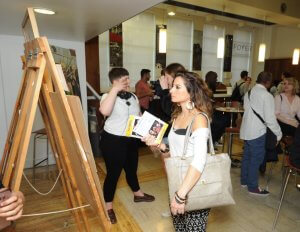
“Sounds of an Unquiet Mind” was an event organised by MIND in Tower Hamlets and Newham (East London). In participation with Beats Learning and Queen Mary University of London, the evening was a celebration and expression of mental health through the creative arts.
MIND is a leading organisation that works to provide support and empowerment to people who are experiencing any kind of mental health issues. From preventative support to active guidance and counselling, MIND also work to raise awareness and promote understanding wherever there may be stigma surrounding these issues.
In speaking to CEO of MIND in Tower Hamlets and Newham, Michelle Kabia a former nurse by trade, I learned that the organisation aims to provide bespoke support to the people who cross their path. Treating each case with the respect it deserves; the staff and volunteers aim to help improve lives. Having dealt with mental health issues in her own family and working with vulnerable people, Michelle believes it’s important to employ self love and self care as a principle factor. The organisation works in schools, has outreach programs, and hosts creative writing groups for those who wish to use it as an outlet.
In conversation with MIND staff and the various performers, some of the common themes of this evening seemed to be that shame and stigma are still prevalent surrounding mental health. That mental health needs to be viewed by people in a similar regard to physical health; that invisible pain is just as important as visible injury, if not more important. We all know someone who struggles with their own mind or perhaps we are the people who are struggling. It is important for us, as a collective, to recognise that there’s ways of dealing with these issues; simple love-filled ways that the majority of us do not get taught from a young age.
Niall Morrissey is the Mental Health Coördinator for Queen Mary University. We sat down to talk about the types of issues he frequently sees among students. Of course there is the expected, but no less relevant, stress, anxiety and depression. Then there are also the students who live with autism and PTSD. I believe these are the individuals who really benefit from the work of mental health professionals. Having worked with people who deal with these issues over the years; I’m familiar with the patience, love and time required by all involved to steer these stories in the healthiest direction. Niall patiently works as the advocate to help students access their services as smoothly as possible; ensuring their mental health is a bridge not a barrier to their studies and effectively, their future.
As people trickled in for the event, I sat on the floor next to the utility room, behind the harpist and cried. If you’ve read some of my previous work you’ll notice that I do that plenty. The crying that is, not the harpist; she was quite a romantic new addition which isn’t likely to be a frequent one. By this point in the evening I’d spent the previous three hours speaking to person after person, and the one thing that became apparent to me was the amount of pain they were carrying. I needed to cry by this point because that pain was now sitting in the pit of my stomach. Although the harpist did make me feel much better; this event in itself was like therapy.

A small orchestra played people into the room. It was beautiful. The grandeur is unmistakable and its’ ability to silence a crowd is undeniable. Even as they performed and took breaks between pieces, nobody applauded and there was really no need to; the silence sat in those moments gracefully and when the applause finally did come, it was genuinely given and wholly received.
The evening was full of beautiful and unique performances; the number of which exceeded single digits. However, I’m going to focus on a select few for their sheer ability to make me feel something deeper than most.
Emily Harrison was a delight to watch. She injected some well-placed and unexpected jokes into her story of being institutionalised. I think she has a beautiful mind and her sense of humour is sweet and wonderfully innocent. I took a moment to try to understand her story, and I can honestly say that though she may not have had an easy life, it seems to have served her heart and spirit well.
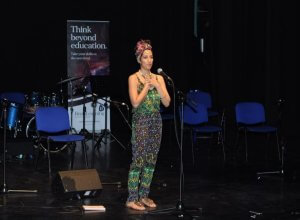
Yasmin Autwal performed her poems. One was about womanhood and made the point that we are fortunate to be female; that we are the closest thing to the creator on this earth. The majority of my life has been a concessionary “you’re good… for a woman” type-of-deal. Being conditioned this way eventually made me believe it; that women can’t share the elevated status of men. Coming from a family where I was encouraged to bury my emotions also made me think that there was something wrong with my high level of sensitivity. This poem made me feel proud to be a woman; it made me feel grateful that I get to, as she said, experience the world through my heart. Thank You Yasmin.
Of course this is a Hip Hop magazine and so it would be a dishonour to avoid mentioning the final act of the night, which was Lowkey. The brother was welcoming, warm and gracious enough to allow me to sit and discuss mental health with him prior to the show, and we explored some interesting ground. He pointed clearly to the fact that men between the ages of 20–49 are more likely to die from suicide than any other cause of death;
“I think that’s largely due to a kind of aversion to talking about these problems because we’re put in a place where we often mutilate our faculties of emotional expression in the name of an idea of manhood, which is completely unrealistic and is based on the kind of pornographication of what it means to be a man, put in these kinds of superhero terms and emotionless terms, and it’s deeply deeply damaging.”
He sang the song “Ahmed”, about the people we’ve lost to the ocean when they were trying to get to Europe; in most cases attempting to escape violent situations perpetuated by the very nations that close their borders. I can’t listen to this song without a heavy heart. Every one of those refugees could be my family and we choose paper borders over human lives almost every day.
We also spoke about music and how it can be a type of therapy for those of us who choose it;
“I think what music does is it facilitates an expression of the soul which is not really facilitated by many other things. I think it allows people to express themselves in a very organic and direct way… it also can provide a cathartic outlet for people to deal with what they’re going through and also deal with their isolation.”
Lowkey, backed by talented pianist Karim Kamar and vocalist Charlotte, also performed “My Soul”; a song that is a beautiful proclamation to the strength of the human spirit and soul. Something I suspect music has allowed him to strengthen and balance in the most beautiful way.
He concluded our interview beautifully when I asked him if he feels that being social is a kind of relief for mental health issues;
“We have to assert that we are a collective and find a collective conscious; I do think that provides protection for people… there is protection in the power of the collective and I definitely think that needs to be actively fostered.”
The entire event left me feeling both emotionally exhausted and whole-heartedly satisfied. There are beautiful people in the world who struggle every day. There are beautiful people in the world who help others get through their day. And then there is the power in creating dialogue, raising self-awareness and reminding ourselves of our inherent inextricable connection to one another. If you suffer, so do I.
This is the language of love and belonging.
These are the Sounds of an Unquiet Mind.
If you, or anyone you know, are experiencing suicidal thoughts, you can find support here
Alternatively, you can call The Samaritans at ANY time on 116 123
https://www.samaritans.org/how-we-can-help-you/contact-us
You can also visit CALM for help specifically dedicated to preventing male suicide… please don’t suffer in silence.
Aisha
Latest posts by Aisha (see all)
- INTERVIEW | 47SOUL INTRODUCE US TO THE SOUNDS OF ELECTRO ARABIC DABKE — October 18, 2019
- INTERVIEW | ASIM QURESHI — AUTHOR OF “A VIRTUE OF DISOBEDIENCE” & DR. LAYLA HADJ – MANAGING DIRECTOR OF CAGE — February 19, 2019
- REVIEW | “A VIRTUE OF DISOBEDIENCE”: MUSLIMS IN TODAY’S SOCIETY — February 19, 2019


